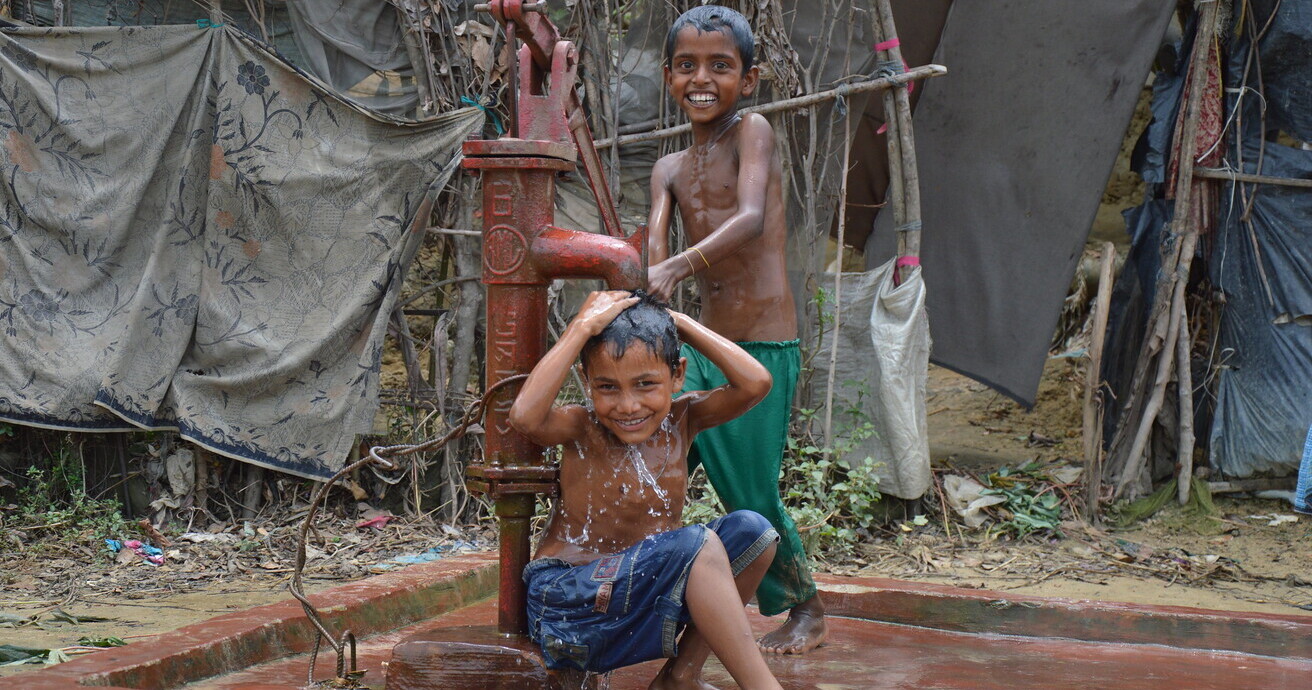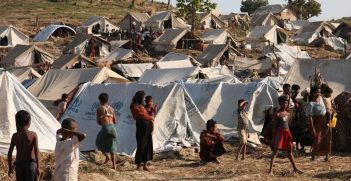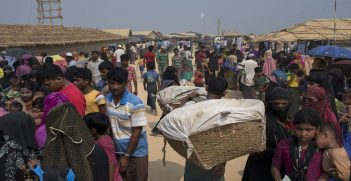Rohingya Crisis: How Bangladesh Became a Symbol of Humanitarianism

COVID-19 has made it even more difficult for developing countries to offer humanitarian assistance. Given these circumstances, the response of Bangladesh to the Rohingya crisis has been exemplary.
Bangladesh is a rapidly developing country, one that is entering a transitory period as it seeks to balance the management of COVID-19, while sustaining economic growth. The Rohingya crisis poses a great obstacle to the country’s growth and development. The forcibly displaced Myanmar nationals (FDMNs) are considered the “most persecuted refugees” around the world. Since August 2017 Bangladesh has hosted more than 1.1 million Rohingya refugees along its restive borderlands with Myanmar. In response to the latest wave of the humanitarian crisis in 2017— at least three other targeted military crackdown like Operation Dragon King were carried out by the Myanmar military against the Rohingyas in 1978, 1992, and 2016 — Bangladesh opened its border and offered a helping hand to the voiceless Arakan Muslims. The continuous support and its vocal role against the oppressors have made the country “a symbol of humanitarianism” around the world.
Historically, the Father of the Nation Bangabandhu, Sheikh Mujibur Rahman, nurtured human security perspectives in his foreign policy priorities. This was reflected in Bangladesh joining the Non-Aligned Movement (NAM), its vocal stance on the Israeli occupation of Palestine, and in its active attempts to assist oppressed people around the world. In recent years, under the leadership of Sheikh Hasina — daughter of Bangabandhu — Bangladesh has taken a more proactive role in maintaining international peace and security. It has received awards from the United Nations for fighting climate change and meeting the goals of its immunisation program, and it remains the largest contributor of personnel to U.N. peacekeeping operations. Since 2017, Bangladesh has submitted three proposals to the United Nations General Assembly (UNGA), to put an end to the protracted Rohingya crisis.
Immediate responses
Though Bangladesh is not a signatory to the 1951 Refugee Convention, the country has been sheltering and providing humanitarian support for the Rohingyas for over a half-decade now. During the tense period of the military crackdown, the country saw a massive influx of Rohingyas fleeing from Myanmar, Bangladesh’s Prime Minister Sheikh Hasina stated: “We have the ability to feed 160 million people of Bangladesh and we have enough food security to feed the 700,000 refugees.” The local residents, groups, and Non-Government Organizations (NGOs) of Bangladesh provided emergency food, shelter, and other assistance to the new arrivals. While many Western developed nations bypassed their responsibilities towards the migrants and refugees, Bangladesh’s decision to accept refugees was an exemplary display of humanitarianism.
Motivating Factors
The identical religious identity between the Bangladeshi Muslims and the Rohingyas has engendered sympathy among the Bangladesh’s citizens who wish to support the ethnic group in distress. Every year Bangladesh provides approximately US $1.2 billion in financial assistance to the Rohingyas. Along with the narrative of “Muslim solidarity”, the legacy of a painful refugeehood experience during the liberation war of independence of Bangladesh in 1971 also played a crucial role in engendering public support for sheltering the forcibly displaced Rohingyas. Many Bangladeshis remember the liberation war of Bangladesh from then West Pakistan (now Pakistan), and how 10 million Bengalis sought refuge in neighbouring India to escape a genocide committed by the Pakistan military.
Harsh realities
Bangladesh has provided shelter the massive 1.1 million Rohingyas by housing them in 34 camps at Cox’s Bazar. Bangladesh’s Rohingya asylum policy is undoubtedly one of the most significant humanitarian efforts in recent history. Given the economic position of Bangladesh, the issue of hosting a large number of Rohingyas with over 167 million people was an unprecedented challenge. Moreover, the population density of Bangladesh is 1265 per square kilometre, making it one of the world’s most densely populated countries. The hosting of the Rohingya refugees has placed tremendous pressure on the economic development of Bangladesh. Bangladesh has no interest here other than the humanitarian ground. However, Bangladesh has been able to maintain a positive rate of economic growth, despite the difficulties of COVID-19 and the influx of displaced Rohingya. The country has become a role model for other refugee-hosting countries. However, five years on, not a single Rohingya refugee has been repatriated —despite formal repatriation efforts being made twice, in November 2018 and again in August 2019.
From Cox’s Bazar to Bhashan Char
Frustrated with the mired repatriation process, tensions between Rohingya and their hosts are increasing at an alarming rate. Over 6,800 acres of forest land has been used to shelter the Rohingya, but this has incurred huge environmental destruction. To address the congestion problem in the Cox’s Bazar camps, as well as to facilitate humanitarian services to the displaced Rohingyas, Bangladesh is moving forward with policies focused on “temporary alternatives” for refugee redistribution until the repatriation takes place. The government of Bangladesh is developing “Bhashan Char Island” with all the provisions to protect the displaced Rohingyas, at a cost of over US $350 million.
As of February 2022, Bangladesh had relocated about 22,597 Rohingyas to Bhashan Char, but they plan to resettle 100,000 Rohingyas there to release pressure on the Cox’s Bazar camps. The rows of white multi-stored buildings with red tops, equipped with electricity, water supply, common kitchens, and playgrounds, makes Bhashan Char seems like a “modern township.” The international community has raised objections to the relocation of refugees to Bhashan Char. However, not only is the placement only temporary, but given that the criticism has come from actors doing far less to support refugees, it rings hollow.
COVID Vaccination
It is true that the Rohingya refugees are staying at the clumsy and densely populated camps in Cox’s Bazar. The Rohingyas get less global attention compared to the Syrian refugees in Turkey, Syrian and Iraqi refugees in Germany, the Afghan refugees in Pakistan, or lately the Ukrainian refugees in Europe. But Bangladesh has provided more than just shelter to these displaced persons. Ever prudent, the Bangladesh government has been able to tackle SARS-COV-2 transmission and reduce mortality among the vulnerable population.
Orchestrating equity and inclusiveness, Bangladesh launched COVID-19 vaccination for Rohingya refugees in Cox’s Bazar camps in August 2021 where at least 48,000 individuals aged over 55 received their first shot of the COVID vaccine. Appreciating the initiative, the Regional Director of the World Health Organization (WHO) Dr Poonam Khetrapal Singh said, “Bangladesh is demonstrating what WHO has been advocating for – equitable access to vaccines. Inclusion is key to protecting vulnerable populations like the refugees, for safeguarding their health and that of their host communities and societies,” The “vaccine hero” Sheikh Hasina, was always pivotal on making “vaccines” a global public good” and ensuring “vaccines for all”.
The bottom line is that from the emergency responses to a temporary relocation to Bhashan Char to COVID vaccination, Bangladesh has become a paragon of humanitarianism symbol. Though the country is continuing its humanitarian support, it is important to note that to achieve a long-term solution to the protracted Rohingya crisis, “They must be able to return to their homes where they lived for centuries,”—which Bangladesh continues to emphasise to the UN.
Shaikh Abdur Rahman is currently working as a researcher at the Central Foundation for International and Strategic Studies (CFISS) based in Dhaka. He writes on South Asia’s politics, human security issues and economic diplomacy, with a particular focus on Bangladesh’s foreign policy. He finished his master’s in international relations from the University of Rajshahi, Bangladesh.
This article is published under a Creative Commons Licence and may be republished with attribution.





